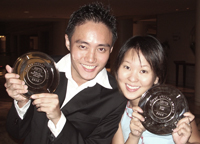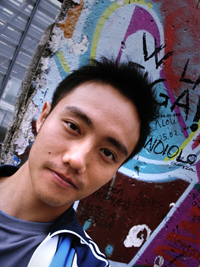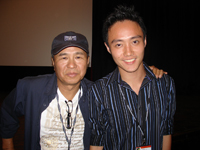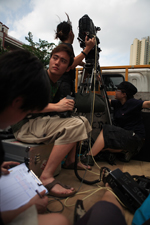 Film enthusiasts are familiar with the cliché, “Stop finding love and it will find you”. And since life imitates art, that holds true even off screen.
Film enthusiasts are familiar with the cliché, “Stop finding love and it will find you”. And since life imitates art, that holds true even off screen.
Boo Junfeng, 23, a promising Singaporean film director who had his works recognised by Singapore International Film Festival (SIFF) since 2005 knows that personally, having found his love for his work only after almost despairing of being able to create art.
“I[‘d] almost given up on the fact that I can express myself. I think I’m quite an observant person but, before I got into film, I didn’t really have a medium of expression. I tried fine arts, I tried sculptures. I tried a lot of these things but I didn’t feel like they were right.”
Although Junfeng had always wanted to do something revolving around film since his days in Chung Cheng High School (Main), he never once thought of becoming a director. The calling came only when he went on an exchange programme to Spain during his final semester as a Film, Sound & Video student in Ngee Ann Polytechnic (NP) in 2004.
 [In Spain] I understood a bit more about directing. Through that, I realised that film might really be a way for me to express myself.”
[In Spain] I understood a bit more about directing. Through that, I realised that film might really be a way for me to express myself.”
It was this desire for self-expression that pushed him to make Un Retrato De Familia (A Family Portrait), which won both the Best Film and Special Achievement awards at the SIFF 2005.
Even though the 2 accolades earned Junfeng the title of the next Royston Tan, the award-winning local director who produced 15, Junfeng “doesn’t like to mimic” but agrees that “originality can be quite subjective”.
“I think in art it’s quite impossible to be 100 percent original. You will have your influences. You will have to develop from your influences. For me, I don’t have one influence, I have many and I’m still exploring.”
According to him, his current biggest inspiration is esteemed Chinese director Hou Hsiao Hsien who produced Three Times, which was awarded best Taiwanese Film in the Golden Horse Awards 2 years ago. That same year, Junfeng was selected by SIFF director, Philip Cheah, to attend the Asian Film Academy (AFA) in Korea to understudy Hou, then the dean of AFA and to interact with other filmmakers through the various workshops.
 Putting to practice what he learnt from Hou, Junfeng is working with 6 other directors on an omnibus project entitled Lucky 7.
Putting to practice what he learnt from Hou, Junfeng is working with 6 other directors on an omnibus project entitled Lucky 7.
“With the Lucky 7 project, I’ve explored a relationship between 2 people. I try to go very deep into [their] emotions and bring it out for my audience. That’s what I was trying to experiment. In fact, that’s what I learnt from Hou Hsiao Hsien..”
Jun Feng hopes that Lucky 7 can be screened at next year’s SIFF as “it’s quite meaningful ” as there are not many opportunities for local film directors to come together and shoot an omnibus project.
He also feels that every piece of work he has directed so far has been personal. They were milestones to mark the different periods of experiences but he has “learnt how to balance what [he] wants to put out professionally and what [he] wants to reserve personally”.
“I used to think that all my work has to be very personal so that it can be real. That’s still true to a certain extent, but now I feel that it should go beyond being personal. The film should be something I understand but at the same time I should try to explore beyond that comfort level because it’s like, ‘I know how this character will react because I’ve been through it’. But I think it’s important to explore beyond this comfort zone.”
 Junfeng’s latest film The Changi Murals premiered at this year’s SIFF while Katong Fugue, an adaptation from Alfian Sa’at’s play of the same name in Landmarks: Asian Boys Vol. 2, was nominated for the Silver Screen Awards and won the Special Jury Prize at this year’s SIFF. Despite his success, the young director remains humble.
Junfeng’s latest film The Changi Murals premiered at this year’s SIFF while Katong Fugue, an adaptation from Alfian Sa’at’s play of the same name in Landmarks: Asian Boys Vol. 2, was nominated for the Silver Screen Awards and won the Special Jury Prize at this year’s SIFF. Despite his success, the young director remains humble.
“[To claim it as success] would be overrating what I’ve done so far. Yes, I think some of my films have been very well received, therefore, successful. But there’s still a long way to go for me in terms of developing the craft. But I must say that I am where I didn’t expect myself to be at this age. It all happened very fast and very early for me when I’m really still learning. I’m just glad the films that I’ve created along my learning journey are appreciated.”
He puts it down to luck that he has made it this far in the film industry. “[Un Retrato de Familia] was recognised right before everyone started realising that they can make their own films from home. Because of this, a huge wave of film making started and I just happen to be riding right on the tip of it,” he explained.
With regards for the future, the hopeful director wishes to teach, with no particular school in mind, after completing his Master’s degree. He will be starting his undergraduate studies in LaSalle-SIA College of the Arts in August.
Despite picking up the books, he’s not turning his back on film. Aficionados can expect a feature film from this young talent within the next 2 to 3 years, he promises, although “nothing concrete has been planned yet”.
